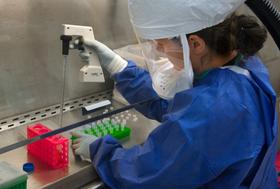The “green jobs” that politicians have been talking about for the past several years may be starting to arrive. As the Grand Rapids Press reports, Michigan will likely soon be home to a new advanced battery-manufacturing plant run by Fortu Powercell Inc., a German-Swiss-based advanced battery manufacturer. The new plant should create up to 726 jobs in the coming years, according to state economists.
This spells great news for prospective community college students looking for the appropriate training in the green technology field.
This video describes the ATRE Energy Storage Curriculum in the California community college system.
New Battery Plants Require a New Kind of Worker
“Clean Room” Environment Means Fewer Environmental Pollutants
Advanced battery-manufacturing plants will require specially trained technicians because of their unique environment. The Grand Rapids Press reports that the lithium-ion battery plant is a “clean room” environment, meaning a controlled work environment that, in contrast to typical manufacturing plants, has low levels of environmental pollutants. Work in these plants will include less of the hands-on duties that are seen in traditional auto manufacturing plants, but more monitoring of machines.
Plant Technicians Will Need Some Specialized Training
In a January 2010 Grand Rapids Press article, lithium-ion battery manufacturing plant manager Elizabeth Rolinski said that the jobs in these new plants will involve “a little less of the repetitive assembly work” and more of “learning how to monitor computers on how processes are going. Rolinski told the Press that “there will be a lot of techs, who may have two-year or four-year degrees” and that “there will be significant production jobs as well.”
This video describes the renewable energy program available at Clinton Community College.
Those who work as technicians in lithium-ion battery plants will need to possess some understanding of chemistry, electricity, and electronics.
Michigan, which suffers from a 15% unemployment rate, is understandably excited at the prospect of the jobs that this new plant will create. As the Muskegon Chronicle reports, Michigan state officials estimate that the average wage of the jobs created by the new plant will be $742 a week.
Community College to Provide Training
One-Year Training Course to Debut in Fall 2010
Lithium-ion batteries are a clean energy alternative that is gathering force, and community colleges are starting to recognize this by creating new training programs that teach students how to properly work with lithium-ion batteries.
In Fall 2010, Grand Rapids Community College will debut a new one-year certification program for energy storage technicians which will prepare students for entry-level positions in lithium-ion battery plants. Julie Parks, the college’s director of workforce training, told the Grand Rapids Press that the college will decide whether the program should have the option of leading to a two-year associate’s degree based on “the requirements of the battery plants.”
Instructors Will Learn from Experts in Other Countries
To prepare to train students for these new battery plant jobs, Green Rapids Community College instructors say they will travel to existing battery plants in France and Korea to learn from experts there.
Lithium-Ion Batteries: Clean Energy Source of the Future?
Preferred Battery for Electric and Hybrid Cars
The New York Times reports that “Lithium-ion batteries are the favored battery type for electric and hybrid vehicles.” These batteries weigh less but hold more energy for longer. In fact, lithium-ion batteries can hold “three times as much as energy per pound as a nickel-metal hydride battery.”
Auto Industry Expert Predicts Lithium Batteries Are Key to Industry Future
Detroit-based AmericaJr reports that at February’s “State of the (Auto) Industry” meeting, Dr. David E. Cole, Chairman of the Center for Automotive Research (CAR), said that he thinks that “the lithium battery is real” and will generate opportunities in the auto industry. He also said that he believes a community college degree should be a minimum requirement for the automobile production jobs of the future.
Job Prospects Look Positive in the Lithium-Ion Battery Manufacturing Industry
Those who choose to complete training programs, such as the one that Grand Rapids Community College will be offering, can look forward to a bright future in terms of job opportunities.
According to the New York Times, the investment advising group Byron Capital Markets predicts that demand for lithium-ion batteries “is slated to rise dramatically,” with an expected increase in demand of 40 percent from 2009 to 2014.
Meanwhile, international financial services group Credit Suisse has predicted a 10.3 percent annual growth in demand for lithium between 2009 and 2020, and a co-author of the Credit Suisse Report says the lithium-ion battery industry will “…be a big industry.”
This all translates into positive news for potential community college students looking for an innovative career.
Questions? Contact us on Facebook. @communitycollegereview















